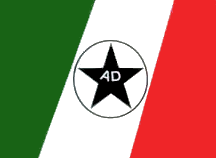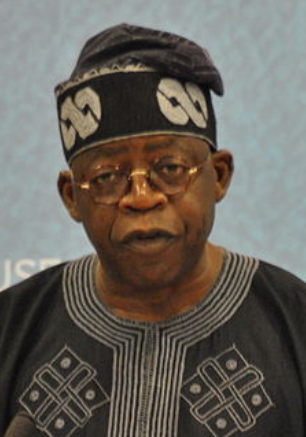
The Peoples Democratic Party (PDP) is one of the two major contemporary political parties in Nigeria, along with its main rival, the All Progressives Congress (APC).

Elections in Nigeria involve choosing representatives for the federal government of Nigeria as well as the various states in the Fourth Nigerian Republic. Elections in Nigeria began in 1959 with several political parties. It's a method of choosing leaders for which the citizens have the right to vote and to be voted for. In 2023, Nigerians were getting ready for presidential elections with about 93.4 million eligible voters across the federation. Elections in Nigeria are held in all tiers of the government. The presidential election, the national assembly elections, the governorship elections and the local government elections.

The Alliance for Democracy is a progressive opposition political party in Nigeria. It was formed on 9 September 1998. At the 2003 legislative elections, the party won 8.8% of the popular vote and 34 out of 360 seats in the Nigerian House of Representatives and 18 out of 109 seats in the Nigerian Senate. The party was reportedly formed to shore up the stake of the Yoruba people in the Nigerian federation following the annulment of the June 12, 1993 presidential election widely believed to have been won by Chief M. K. O. Abiola, a Yoruba multi-millionaire businessman.

The All Progressives Grand Alliance (APGA) is a Nigerian political party formed in June 2002 and has governed the South eastern state of Anambra since 2003.
The United Nigeria People's Party was a political party in Nigeria formed and led by Chief Donald Etiebet during General Sani Abacha's military era. It succeeded the United Nigeria Democratic Party.

The All People's Party (APP) is a former Nigerian political party. It was formed in late 1998 during a transition from military to civilian rule by a coalition of associations that received considerable support under the regime of Sani Abacha.

The Third Republic was the planned republican government of Nigeria in 1992 which was to be governed by the Third Republican constitution. In the Third Republic, there were democratically elected state governors and state assemblies and a democratically elected federal legislature. The republic was however not fully democratic as there was no democratically elected civilian president. The then military president Ibrahim Babangida's supposed transition eventually turned out to be a ploy to keep executive powers and grant the National Assembly limited legislative powers. Hence all laws passed by the Senate and House of Representatives will have to pass the National Defence and Security Council of Nigeria and finally approved by the President. So while Babangida changed the usual style adopted by preceding military leaders from Head of State to president, he will continue to postpone presidential elections and eventually annul the ultimate one held on 12 June 1993. The Third Republic can thus be described as half military and half civilian.

The Nigerian National Assembly delegation from Kano comprises three Senators and fifteen Representatives. They form the legislature of Kano State, Nigeria.

Parliamentary elections were held in Nigeria on 12 December 1959. The result was a victory for the Northern People's Congress, which won 134 of the 312 seats in the House of Representatives, despite the National Council of Nigeria and the Cameroons and Action Group receiving more votes. It formed a coalition with five other parties and two independents, holding a total of 148 seats.

Parliamentary elections were held in Nigeria on 30 December 1964, although they were not held until 18 March 1965 in some constituencies in Eastern Region, Lagos, and Mid-Western Region due to a boycott in December. The election saw most parties run as part of alliances, the Nigerian National Alliance and the United Progressive Grand Alliance.

Parliamentary elections were held in Nigeria on 7 July 1979 for the first time since 1964 to elect a Senate and House of Representatives on 14 July. The result was a victory for the National Party of Nigeria, which won 36 of the 95 Senate seats and 168 of the 449 House seats. It formed a coalition with the Nigerian People's Party in order to gain a majority. Voter turnout was just 30.7% in the House election.

Parliamentary elections were held in Nigeria in August 1983. The Senate was elected on 20 August and the House of Representatives on 27 August. The result was a victory for the ruling National Party of Nigeria, which won 60 of the 96 Senate seats and 306 of the 450 House seats.

The All Progressives Congress (APC) is one of the two major contemporary political parties in Nigeria, along with the Peoples Democratic Party (PDP). Founded on 6 February 2013 from a merger of Nigeria's three largest opposition parties, the party came to power following the victory of party candidate Muhammadu Buhari in the 2015 presidential election. This marked the first time in Nigerian history that an opposition party unseated a governing party and power was transferred peacefully.
The 2019 Nigerian House of Representatives elections in Bayelsa State was held on February 23, 2019, to elect members of the House of Representatives to represent Bayelsa State, Nigeria.
The 2019 Nigerian House of Representatives elections in Gombe State was held on February 23, 2019, to elect members of the House of Representatives to represent Gombe State, Nigeria.
The 2003 Nigerian House of Representatives elections in Federal Capital Territory was held on April 12, 2003, to elect members of the House of Representatives to represent Federal Capital Territory, Nigeria.
The 2019 Nigerian House of Representatives elections in Kano State was held on February 23, 2019, to elect members of the House of Representatives to represent Kano State, Nigeria.

The 2019 Nigerian House of Representatives election was held in all 360 constituencies where voters elected members of the House of Representatives using first-past-the-post voting. Most elections were held on February 23, 2019 with some elections running into February 24 while others had supplementary or rerun elections that took place at a later date. The last regular House elections for all districts were in 2015.

The 2023 Nigerian presidential election in Taraba State will be held on 25 February 2023 as part of the nationwide 2023 Nigerian presidential election to elect the president and vice president of Nigeria. Other federal elections, including elections to the House of Representatives and the Senate, will also be held on the same date while state elections will be held two weeks afterward on 11 March.

The 2023 Nigerian presidential election in Plateau State will be held on 25 February 2023 as part of the nationwide 2023 Nigerian presidential election to elect the president and vice president of Nigeria. Other federal elections, including elections to the House of Representatives and the Senate, will also be held on the same date while state elections will be held two weeks afterward on 11 March.








